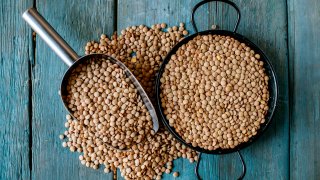
"Superfood" is the buzzy word many people use to describe foods that are packed with nutrients and have many benefits, ones that experts sometimes say are essential to a healthy diet. Think: kale, blueberries, chia seeds and avocados.
But many dietitians wish the term would go away.
"I don't really resonate with the 'superfoods' idea," says Felicia Porrazza, a registered dietitian nutritionist. "One food is not going to be a cure-all. It's really about someone's dietary patterns [and] their other lifestyle factors."
The idea of superfoods can lead people to overlook healthy alternatives, Porrazza adds.
Diana Ushay, registered dietitian at New York-Presbyterian Hospital and Erica Leon Nutrition, agrees. "There are so many foods that are good for you that if we just isolate certain ones, it's going to increase demand for these products," Ushay says.
"Also, I don't think you can really call something a superfood if it's not accessible to everyone of all budgets."
Instead of 'superfood,' use 'nutrient-dense'
Money Report
"What's funny about superfoods is that there isn't really a regulated, accepted definition," says Porrazza.
Most people use the term to define foods that have a high nutritional value and provide benefits beyond what other typical foods offer. "I like to think of a 'superfood' as being in the category of a nutrient-dense food," Porrazza says.
Get a weekly recap of the latest San Francisco Bay Area housing news. Sign up for NBC Bay Area’s Housing Deconstructed newsletter.
"One that would be high in nutrients and low in calories. It's going to have vitamins, minerals [and] maybe complex carbohydrates."
Kale, quinoa and chia seeds aren't the only healthy foods
This doesn't mean that popular "superfoods" aren't beneficial, says Ushay, because they are great choices. But kale, quinoa and chia seeds aren't the only healthy foods to choose from, Porrazza says.
Here are some nutrient-dense foods that Porrazza and Ushay say deserve just as much attention:
1. Legumes
"Lentils [and] any kind of legume are really fantastic sources of nutrients [like] fiber and protein," Ushay says. Legumes are "such an affordable and healthy food that people could really be focusing on."
Some legumes you can try in your next meal include:
- Lentils
- Chickpeas
- Beans
- Peanuts
They're also very high in potassium, "which is really good for the heart," Porrazza notes.
2. Dark, leafy greens beyond just kale
Dark, leafy greens are packed with nutrients like iron and vitamins A and K, says Porrazza. They're extremely versatile, which gives you plenty of options to choose from for how to prepare them.
"You can certainly do things like salads, but you can also throw them into a smoothie or do a stir fry," Porrazza says.
Consider going for one or two of these options on your next grocery run:
- Spinach
- Arugula
- Collard greens
- Bok choy
- Mustard greens
- Or, of course, kale
3. Berries and frozen fruit
"No fruit is off limits," says Porrazza, but berries are lower in naturally occurring sugar so they're a nice choice.
Blueberries are already a pretty well-known "superfood," but other berries like blackberries and raspberries are also high in nutrients, she adds.
"They're great in terms of antioxidant capacity, are high in vitamin C and great in terms of fiber content," says Porrazza.
Even frozen options for fruits, like berries, can provide many health benefits, says Ushay. "They're frozen at their peak freshness," she says, "and they really don't have any less of a nutrient profile than fresh stuff."
DON'T MISS: Want to be smarter and more successful with your money, work & life? Sign up for our new newsletter!
CHECK OUT:
- Is it a food allergy or food sensitivity? This chart can help tell the difference
- Healthy alternatives to 7 of the most popular processed and ultra-processed foods






